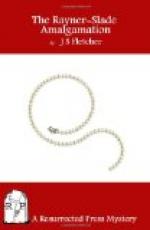“It’s a fortunate thing for me to have a man who seems to know everybody,” remarked Allerdyke. “I suppose it’s living in London gives you so much acquaintance?”
“It’s my business to know a lot of people,” answered Fullaway. “The more the better—for my purposes. I’ll tell you how I came to know your cousin later that’s rather interesting. Well, here’s the place, and it’s five to eight now. We’ve struck it very well, and the only trouble’ll be about getting good seats, especially as we’re in morning dress.”
Allerdyke smiled at that—in his opinion, money would carry a man anywhere, and there was always plenty of that useful commodity in his pockets. He insisted on buying the seats himself, and after some parleying and explaining at the box-office, he and his companion were duly escorted to seats immediately in front of a flower-decked platform, where they were set down amidst a highly select company of correctly attired folk, who glanced a little questioningly at their tweed suits, both conspicuous amidst silks, satins, broadcloths, and glazed linen. Allerdyke laughed as he thrust a program into Fullaway’s hand.
“I worked that all right,” he whispered. “Told the chap in that receipt of custom that you were a foreigner of great distinction travelling incognito in Scotland, and I your travelling companion, and that our luggage hadn’t arrived from Aberdeen, so we couldn’t dress, but we must hear this singing lady at all cost and in any case. Then I slapped down the brass and got the tickets—naught like brass in ready form, my lad! Now, then, when does the desired party appear?”
Fullaway unfolded his program and glanced over the items. The Concert-Direction of Ernest Weiss was famous for the fare which it put before its patrons, and here was certainly enough variety of talent to please the most critical—a famous tenor, a popular violinist, a contralto much in favour for her singing of tender and sentimental songs, a notable performer on the violincello, a local vocalist whose speciality was the singing of ancient Scottish melodies, and—item of vast interest to a certain section of the audience—a youthful prodigy who was fondly believed to have it in her power to become a female Paderewski. These performers were duly announced on the program in terms of varying importance; outstanding from all of them, of course, was the great star of the evening, the one and only Zelie de Longarde, acknowledged Queen of Song in Milan and Moscow, Paris and London, New York and Melbourne.
“Comes on fifth, I see,” observed Allerdyke, glancing over his program unconcernedly. “Well, I suppose we’ve got to stick out the other four. I’m not great on music, Fullaway—don’t know one tune from another. However, I reckon I can stand a bit of noise until my lady shows herself.”
He listened with good-natured interest, which was not far removed from indifference, to the contralto, the ’cellist, the violinist, only waking up to something like enthusiasm when the infant prodigy, a quaint, painfully shy little creature, who bobbed a side curtsey at the audience, and looked much too small to tackle the grand piano, appeared and proceeded to execute wonderful things with her small fingers.




